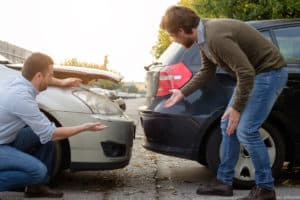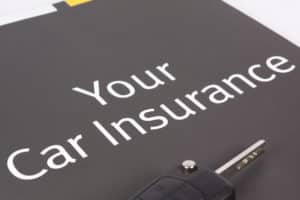What is Property Damage?
Home » Personal Injury Resources » What is Property Damage?

A property damage claim is a claim for damage to a thing rather than to a person. It is not a personal injury claim, although auto insurance policies that cover personal injury liability also cover property damage. Property damage liability insurance applies after a car accident, where one driver files a third-party claim against the at-fault driver’s liability insurance policy. The rules are different in “no-fault” auto accident liability states.
Table of Contents
Auto Accident Liability Insurance

California drivers can legally carry as little as $5,000 maximum property damage liability insurance. A total loss of an average automobile could well exceed this liability limit. Many California drivers carry only minimum insurance and lack personal assets to pay the balance of a sizable claim. In this case, you will need to look for other defendants who might be liable for your property damage.
Possible Third-Party Defendants
The following parties might bear full or partial liability for your property damage claim:
- The at-fault driver’s employer, if they were acting within the scope of employment at the time of the accident.
- The manufacturer of a defective auto part, if the defect contributed to the accident.
- The state or local government, if poor road construction or a malfunctioning traffic light contributed to the accident.
- An alcohol vendor who sold alcohol to an intoxicated minor, if that minor was the at-fault driver and the intoxication caused the accident that caused your property damage.
If the at-fault party was a commercial truck driver or an on-duty Uber or Lyft driver, their insurance should be enough.
The Statute of Limitations
Under California law, you have until three years after an accident to file a property damage lawsuit (subject to exceptions). If you miss the deadline, you can never file a lawsuit, and your claim’s value will fall to zero.
Do not confuse the three-year property damage statute of limitations deadline with the two-year statute of limitations deadline for filing a lawsuit. Even if the two-year personal injury deadline expires, you can still file a property damage lawsuit until the three-year property damage deadline expires.
Proof of Loss Statement
California law requires you to offer the insurance company a written and signed “proof of loss” statement. It must include the time and cause of your property damage, with an approximate dollar amount for the total loss and an estimate for each component of your loss.
Investigation of Your Claim
It is the insurance company’s responsibility, not yours, to investigate the cause of your property damage. All you need to do is to describe the damage to the best of your ability in your proof of loss statement. You can hedge your bets by describing your estimate as “partial”, “known as of today”, “exceeding $XXX”, or some other qualifying language. You need to note that you are not an expert and that it is the insurance company’s responsibility to investigate your claim.
A lawyer can help you with this process, and they can prevent the insurance company from taking advantage of you.
The “Passing the Buck” Ruse
If you choose to represent yourself, the insurance company will probably assume that you don’t understand California law on the investigation of a property damage claim. They may try to convince you that investigating your claim is your responsibility, not theirs. They might demand that you hire an expert to provide a professional estimate.
The insurance company might even reject your claim because it is not precise enough. The insurance company is probably breaking the law if it does this because it would probably be dealing with you in bad faith.
The Misrepresentation Trap
One way the insurance company can avoid paying your claim is to prove that you deliberately misrepresented it. They might not have to pay out your claim if you misrepresent it in an important way. The insurance company may try to bait you into doing just that.
Learn to recognize the signs of an attempt to bait you into misrepresenting your claim, and don’t fall for them. Prepare your proof of loss statement in accordance with the following principles:
- State your claim, but don’t overstate it;
- Be honest about what you do and do not know;
- Insert appropriate disclaimers; and
- Make sure the statement reflects the fact that the insurance company must investigate your claim and confirm your loss.
Just because it is the insurance company’s responsibility to confirm your loss doesn’t mean you can’t dispute it later at the settlement table or in court.
Seek the Assistance of an Attorney
If you have suffered an accident that caused you property damage, and if the accident may have been the other driver’s fault, you should at least look into a claim for property damage. The same lawyer who represents you in the property damage claim will likely be qualified to represent you in a personal injury claim arising from the same accident.
